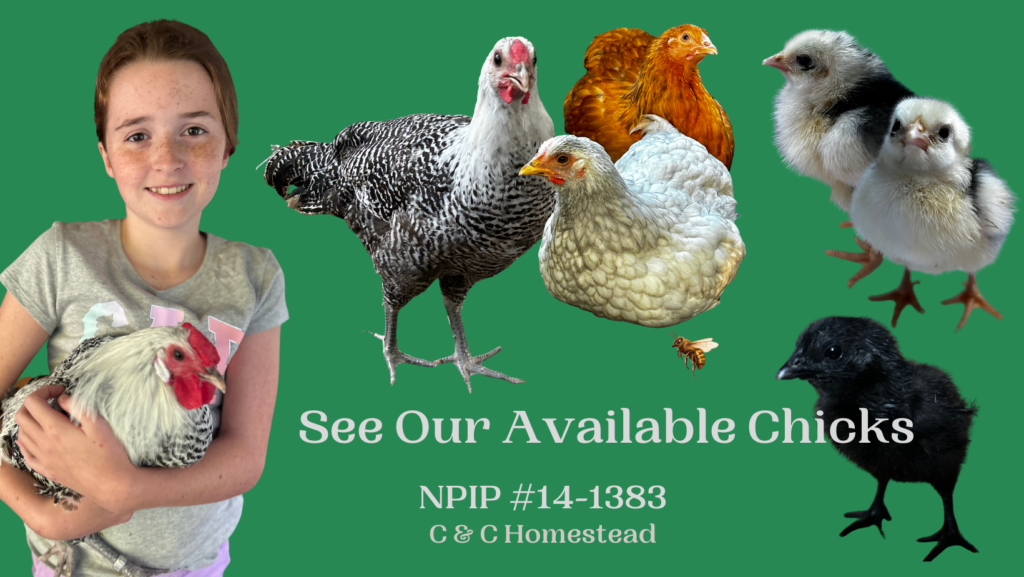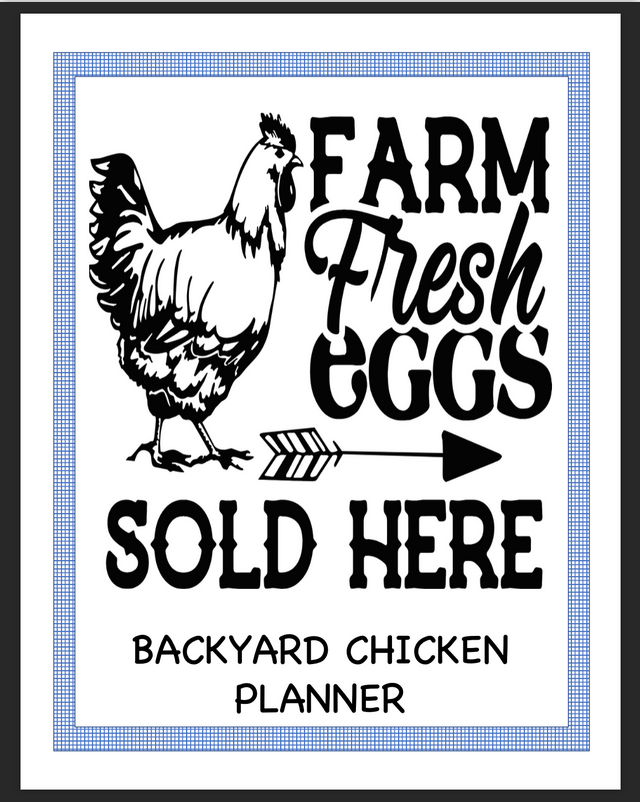Balancing Corporate & Homesteading Lifestyles
Can Bird Flu Affect Dogs and Other Animals? What Chicken and Pet Owners Need to Know
With the ongoing spread of bird flu, many backyard chicken keepers and pet owners are wondering whether their dogs and other animals are at risk. While bird flu primarily affects birds, certain strains—especially Highly Pathogenic Avian Influenza (HPAI) H5N1 —have been known to infect other species, including dogs, cats, and even some mammals.
Understanding how bird flu spreads and the risks it poses to different animals can help chicken and pet owners take the necessary steps to protect their flocks and furry companions.
Yes, dogs can contract bird flu, but infections are rare and usually occur through direct exposure to infected birds or contaminated environments.
How dogs can become infected:
- Eating raw or under-cooked poultry from infected birds.
- Contact with sick or dead wild birds, especially waterfowl (ducks, geese).
- Exposure to contaminated water, soil, or surfaces where infected birds have been.
- Inhaling virus particles from heavily contaminated areas.
Symptoms of bird flu in dogs:
- Coughing and difficulty breathing.
- Lethargy and fever.
- Loss of appetite.
- Nasal discharge and eye inflammation.
- Vomiting or diarrhea (in some cases).
If your dog shows these symptoms after potential exposure, consult your veterinarian immediately.
Other Animals That Can Be Affected by Bird Flu
In addition to chickens and dogs, several other animals have been found susceptible to avian influenza, including:
Cats: Domestic cats and wild felines (such as tigers and leopards) have contracted H5N1 after consuming infected birds.
- Risks for cat owners: Outdoor cats that hunt birds or scavenge carcasses may be at higher risk.
- Symptoms in cats: Fever, respiratory issues, and neurological symptoms (seizures, lack of coordination).
Wildlife (Foxes, Raccoons, Bears): Predatory and scavenging mammals, including foxes and raccoons, have been infected after consuming sick birds.
- This poses an indirect risk to backyard flocks, as infected wildlife can spread the virus through their feces and contact with coops or water sources.
Livestock (Pigs, Cows): While pigs are considered a possible "mixing vessel" for flu viruses, infections remain rare. In 2024, cases of H5N1 were confirmed in cattle, raising concerns about cross-species transmission and potential risks for farmers.
Small Mammals (Ferrets, Minks, Rodents): Ferrets and minks are particularly susceptible due to their respiratory systems, and outbreaks have been reported on fur farms.Rodents (rats, mice) may not get sick but can carry and spread the virus to chicken coops and food supplies.
Why This Matters for Chicken and Pet Owners
If bird flu is present in your area, it’s important to take precautions, not only for your flock but also for your pets and other animals that might come into contact with the virus.
Potential risks for backyard chicken and pet owners:
- Pets as carriers: Dogs and cats that roam freely may come into contact with infected wild birds or droppings and track the virus back to your flock.
- Contaminated environments: Bird flu can survive on surfaces such as shoes, feeders, and waterers, increasing the risk of spreading to both animals and humans.
- Wildlife exposure: Predators and scavengers attracted to chicken coops can introduce the virus if they have fed on infected birds.
How to Protect Your Flock and Pets from Bird Flu
- Limit Contact with Wild Birds: Keep your chickens in a covered run to prevent exposure to wild birds.Avoid feeding pets outdoors where wild birds can access food.
- Practice Good Biosecurity: Wash hands, shoes, and clothing after tending to your flock.Use footbaths and change clothes before interacting with pets.Keep feed and water covered to prevent contamination.
- Supervise Free-Ranging Pets: Keep dogs and cats from roaming in areas where wild birds congregate.Discourage pets from hunting or scavenging wild birds.
- Safe Handling of Poultry Products: Always cook poultry products thoroughly before feeding them to pets.Avoid feeding raw eggs or raw chicken scraps if bird flu is present in your area.
- Monitor for Symptoms: Regularly observe your chickens and pets for signs of illness and report any suspicious cases to your vet or local agricultural authority.
Final Thoughts: Should You Be Worried?
While bird flu can infect animals beyond poultry, the risk to dogs, cats, and other pets remains low with proper precautions. By staying informed and practicing good biosecurity, chicken and pet owners can greatly reduce the risk of exposure and keep their flocks and furry friends safe.
If you suspect bird flu in your flock or pets, it's important to act quickly by contacting a veterinarian or agricultural authority. Early detection and prevention are key to minimizing the impact of this disease.
For more tips on keeping your flock safe, download our free eBook The Biosecure Backyard and learn practical steps to identify and reduce risks unique to your flock practical ways to minimize them.
📖Get your free copy here!
Stay safe and stay informed!
Understanding Bird Flu Risks for Backyard Chickens
Avian influenza, commonly known as bird flu, is a growing concern for poultry keepers worldwide. While backyard flocks are generally at lower risk compared to large commercial operations, certain factors can increase vulnerability depending on your flock’s environment and management practices.
In this article, we’ll explore the real risks of bird flu for backyard chickens, factors that are beyond your control, and practical steps you can take to minimize the risks that are within your power.
For most backyard chicken owners, the risk of bird flu is relatively low, but it's not zero.
Unlike commercial poultry farms, backyard flocks are often smaller, more isolated, and exposed to fewer outside factors, which helps reduce the spread of disease. However, certain conditions can increase the chances of exposure, and understanding these risk factors is key to protecting your birds.
Bird flu spreads primarily through wild birds, contaminated surfaces, and human activity, meaning that flock owners must remain vigilant, especially during active outbreaks in their area.
Uncontrollable Risk Factors: What’s Beyond Your Control?
Despite your best efforts, some risks are simply out of your hands.
These factors can create an environment where exposure to bird flu becomes more likely:
1. Proximity to Other Flocks
- If you live near commercial poultry farms or other backyard chicken keepers, your risk increases. Even if you maintain good biosecurity, nearby infected flocks can act as a source of airborne contamination or introduce the virus through shared wildlife.
- Risk Reduction Tip: Stay informed about outbreaks in your area through USDA or state agricultural alerts.
2. Wild Bird Presence
- Waterfowl, such as ducks and geese, are natural carriers of avian influenza and can spread the virus through their droppings. Birds like sparrows and pigeons can also carry contaminated materials into your flock’s space.
- Risk Reduction Tip: Reduce attractants like open feed sources and standing water that might invite wild birds into your yard.
3. Windborne Transmission
- The bird flu virus can be carried short distances via wind, especially if you are downwind of an infected area such as a poultry farm or wetland with high wild bird activity.
- Risk Reduction Tip: While you can't control the wind, positioning your coop in a sheltered area and using barriers like trees or fencing may help reduce exposure.
4. Environmental Factors (Lakes, Wetlands, and Migratory Routes)
- Living near bodies of water or migratory bird flyways significantly increases exposure risk as infected wild birds frequently pass through and contaminate the area.
- Risk Reduction Tip: Monitor seasonal migrations and adjust your flock’s access to open areas during peak times.
5. Rodents and Insects
- Rats, mice, and flies can track contaminated droppings or organic matter into your flock’s area, potentially introducing the virus.
- Risk Reduction Tip: Implement a robust pest control strategy, such as secure feed storage and regular coop maintenance.
6. Weather Conditions
- Cold, damp environments help the virus survive longer, making outbreaks more persistent during cooler months.
- Risk Reduction Tip: Ensure proper drainage around the coop and keep bedding dry to reduce the likelihood of viral persistence.
Controllable Risk Factors: What You Can Do to Protect Your Flock
While some risks are unavoidable, there are many practical steps you can take to significantly reduce the risk of bird flu in your backyard flock.
1. Free Ranging Practices
- Increased Risk: Allowing chickens to free-range exposes them to wild birds, contaminated soil, and water sources that could harbor the virus.
- Risk Reduction Strategy: Consider supervised free-ranging or using a covered, fenced run to limit their exposure to high-risk areas.
2. Coop and Run Security
- Increased Risk: Gaps or open areas in the coop allow wild birds or rodents to enter and contaminate the environment.
- Risk Reduction Strategy: Ensure all coop openings are covered with fine mesh wire, and maintain a secure perimeter to deter wildlife.
3. Foot Traffic and Biosecurity Measures
- Increased Risk: Visitors, farm workers, or even you can inadvertently track the virus into your flock's area through contaminated shoes or clothing.
- Risk Reduction Strategy: Use dedicated coop shoes and clothing that stay on-site.Provide a foot bath station with disinfectant at the entrance to the coop.Limit unnecessary visitors and educate family members about biosecurity protocols.
4. Feed and Water Management
- Increased Risk: Leaving feed and water sources exposed can attract wild birds and other carriers of the virus.
- Risk Reduction Strategy: Use covered feeders and waterers that prevent contamination.Clean and disinfect feeding areas regularly. Consider switching to a nipple waterer system to minimize exposure.
5. Introducing New Birds to Your Flock
- Increased Risk: Bringing in new birds without proper quarantine increases the chance of introducing disease.
- Risk Reduction Strategy: Always quarantine new birds for at least 30 days before integrating them into your flock.
6. Handling and Equipment Sharing
- Increased Risk: Sharing equipment, such as feeders, incubators, or tools with other chicken keepers, can spread disease.
- Risk Reduction Strategy: Avoid sharing equipment, and if necessary, disinfect thoroughly before use.
7. Monitoring and Early Detection
- Increased Risk: Failing to recognize early symptoms can allow the disease to spread unnoticed.
- Risk Reduction Strategy: Regularly check your flock for signs such as: (1) Respiratory distress (coughing, sneezing, nasal discharge). (2) Swelling of the head, eyes, or legs. (3) Sudden drop in egg production. (4) Lethargy or unusual behavior.
Final Thoughts: Balancing Risk and Practicality
While bird flu is a serious concern, especially during active outbreaks, it’s important to remember that with proper precautions, the risk to backyard flocks can be minimized. By focusing on controllable factors, such as coop security, feed management, and biosecurity, you can significantly reduce your flock’s exposure to avian influenza.
Every flock is unique, and risk levels will vary based on your location and management. style. Taking small, manageable steps towards better biosecurity can make a big difference in protecting your flock’s health.
For more tips on keeping your flock safe, download our free eBook The Biosecure Backyard and learn practical steps to identify and reduce risks unique to your flock practical ways to minimize them..
📖Get your free copy here!
Stay safe and stay informed!
Can Bird Flu Be Passed Through Eggs and Are the Eggs Safe To Eat?
With increasing reports of bird flu outbreaks, many chicken keepers and consumers are wondering: Are eggs from infected birds safe to eat? Can bird flu be transmitted through eggs?
These are valid concerns, especially for those who raise backyard flocks or purchase eggs from local farms. In this article, we’ll explore the safety of eggs from birds exposed to avian influenza (bird flu), whether the virus can be transmitted through eggs, and what precautions you should take to protect yourself and your flock.
The risk of bird flu (avian influenza, or AI) being transmitted through eggs is extremely low, but not impossible. The virus primarily spreads through direct contact with infected birds, their saliva, respiratory secretions, and droppings. However, in severe cases of infection, the virus can be found inside the reproductive tract, potentially contaminating eggs before they are laid.
Key Facts About Bird Flu and Eggs:
Eggs from Healthy Birds Are Safe: If your flock is healthy and showing no signs of avian influenza, the eggs are considered safe to eat when properly handled and cooked.
Transmission Through Eggshells: Bird flu virus particles can contaminate the eggshell if the chicken comes into contact with infected droppings or bedding.Washing eggs with warm water and a mild disinfectant can help reduce the risk of surface contamination.
Internal Contamination: In rare cases, highly pathogenic avian influenza (HPAI) can enter the egg internally if the hen is actively infected, but such eggs typically show signs of being abnormal (soft shells, misshapen, or discolored). Infected hens often stop laying eggs altogether when severely affected.
Are Eggs from Infected Birds Safe to Eat?
If a bird is infected with avian influenza, the USDA and CDC recommend not consuming eggs from the infected flock. This is because:
Potential Contamination: Infected birds may shed the virus onto the eggshell or into the egg itself, posing a slight risk of ingestion.
Immune Response Effects: Eggs from sick birds might have a lower quality and could contain abnormalities due to the bird's immune system fighting the infection.
Cooking Kills the Virus: Proper cooking (to an internal temperature of 165°F/74°C) destroys the avian influenza virus, making thoroughly cooked eggs safe to eat even if the shell was exposed to the virus.
However, it's still recommended to avoid consuming raw or undercooked eggs during an outbreak.
Precautions for Backyard Flock Owners
If you keep backyard chickens, it’s important to follow biosecurity measures to ensure your flock stays healthy and your eggs remain safe to eat. Here are some essential precautions:
Monitor Your Flock for Symptoms: Signs of bird flu include lethargy, respiratory distress, decreased egg production, and sudden death. If you suspect infection, stop consuming eggs from your flock and contact your local agricultural authority.
Egg Handling Safety Tips: Wash eggs thoroughly in warm water to remove dirt and potential contaminants. Store eggs in the refrigerator to slow bacterial growth. Always cook eggs fully before eating.
Practice Biosecurity Measures: Limit visitors to your coop and avoid contact with wild birds.Disinfect shoes, equipment, and hands before and after handling your flock.Keep feed and water sources covered to prevent contamination.
What Do Health Authorities Say?
According to the USDA (United States Department of Agriculture) and the CDC (Centers for Disease Control and Prevention):
- Commercially sold eggs are safe, as the U.S. egg industry follows strict monitoring and safety measures to ensure eggs are free from contamination.
- Pasteurization, which is required for all eggs sold in the U.S. that are not labeled as "fresh," effectively kills bacteria and viruses, including avian influenza.
There is no evidence that eating properly cooked eggs has caused bird flu infections in humans.
Key Advice:
The USDA continues to monitor egg safety closely, and consumers should follow proper food handling practices to minimize any risks.
FAQs About Bird Flu and Egg Safety
1. Can I get bird flu from eating eggs from my backyard chickens?
If your flock is healthy and you practice proper egg-handling hygiene, the risk is very low. However, always cook eggs thoroughly to ensure safety.
2. Should I stop eating eggs during a bird flu outbreak?
No, you can continue eating eggs as long as they are from healthy birds and properly cooked. Commercial eggs are safe due to strict safety protocols.
3. How can I tell if an egg is infected with bird flu?
There are no visible signs of bird flu in eggs, but infected birds may lay eggs with irregular shapes or soft shells. If your flock shows symptoms, avoid eating their eggs.
4. Can I wash eggs to remove bird flu contamination?
Yes, washing eggs can remove surface contaminants, but it won’t address internal contamination if the bird is infected.
5. What temperature kills bird flu in eggs?
Cooking eggs to 165°F (74°C) effectively kills avian influenza viruses, making them safe to eat.
Conclusion: Should You Worry About Bird Flu and Eggs?
While the risk of contracting bird flu from eggs is very low, it's still important to take precautions when handling and cooking eggs, especially during an outbreak.
Ensuring your flock stays healthy through proper biosecurity and hygiene practices is the best way to keep your eggs safe to eat.
Key Takeaways:
- Proper cooking eliminates the virus.
- Eggs from healthy flocks are safe to consume.
- Maintain biosecurity to prevent infection in your flock.
- By staying informed and following best practices, you can continue to enjoy fresh eggs with confidence!
For more tips on keeping your flock safe, download our free eBook The Biosecure Backyard, which covers biosecurity measures and flock health strategies.
📖 Get your free copy here: The Biosecure Backyard
Are Bird Flu Cases Rising?
Yes, bird flu cases are currently on the rise, both globally and in the United States. According to data from the USDA (United States Department of Agriculture) and the World Organisation for Animal Health (WOAH), the highly pathogenic avian influenza (HPAI) H5N1 strain has been spreading more aggressively since early 2022 and has continued to affect wild birds and domestic poultry into 2024.
Key Statistics:
In the U.S., over 58 million poultry birds were affected in 2022-2023, marking one of the worst outbreaks in history.
In 2024, outbreaks have persisted year-round, whereas in the past, they typically declined in warmer months. Bird flu has been detected in wild birds across all 50 states, increasing the risk of spread to domestic flocks.
Why Are Bird Flu Cases Rising?
Several factors are contributing to the increase in reported bird flu cases, including:
1. Increased Surveillance and Reporting
Advancements in diagnostic technology and improved monitoring by government agencies have led to earlier detection and more accurate tracking of avian influenza outbreaks. In the past, some cases may have gone undetected, but today, routine testing of commercial and backyard flocks allows for quicker identification and response.
What this means:
- More frequent testing results in higher reported numbers, but it doesn't necessarily mean the virus is spreading more than in the past—it may simply be better tracked.
2. Wild Bird Migration Patterns
Wild birds, particularly waterfowl like ducks and geese, are natural carriers of avian influenza. In recent years, changes in migratory patterns and larger populations of infected birds have increased the virus's spread to new areas.
Key concerns:
Birds that carry the virus can introduce it to domestic flocks through contaminated droppings and shared water sources. The virus has been detected in migratory flyways that intersect with major poultry farming regions.
3. Environmental Conditions
Weather and climate changes have contributed to the persistence of the virus in the environment. Colder, wetter conditions help avian flu viruses survive longer in soil, water, and organic matter, increasing the risk of exposure for poultry farms and backyard flocks.
What makes this year different?
Avian flu typically peaks in colder months, but the virus has remained active year-round, likely due to favorable environmental conditions.
4. Commercial and Backyard Flock Growth
With the rising popularity of backyard chicken keeping, more people are raising poultry in urban and suburban areas. These smaller flocks may have less stringent biosecurity measures, increasing the risk of transmission between flocks.
What you can do:
Backyard flock owners should adopt stricter biosecurity measures to prevent potential exposure from wild birds and neighboring flocks.
5. Potential Virus Mutations
Avian influenza viruses are known for their ability to mutate and adapt. Recent outbreaks have shown strains with increased persistence in wild bird populations, making containment more challenging. Scientists are closely monitoring for any mutations that could increase transmissibility between birds or to humans.
Concerns about mutations:
Although human infection remains rare, ongoing surveillance is crucial to prevent potential public health risks.
How to Protect Your Flock from Bird Flu
Whether you're a backyard chicken keeper or a commercial farmer, the rise in bird flu cases means biosecurity should be a top priority. Here’s what you can do to reduce the risk:
Limit Contact with Wild Birds: Keep your flock enclosed and covered to prevent exposure to wild birds and their droppings. Avoid sharing water sources with wild birds.
Practice Good Biosecurity:
1) Always wash hands and change footwear before and after entering the coop.
2) Sanitize equipment and avoid bringing in outside materials that could carry the virus.
3) Limit visitors to your flock and ensure they follow biosecurity measures.
Monitor Your Birds Closely: Watch for signs of illness, such as respiratory distress, lethargy, or a sudden drop in egg production.
Report any suspected cases to your local agricultural authority immediately.
Stay Informed: Follow updates from reliable sources like the USDA, CDC, and state agricultural departments to stay aware of local outbreaks.
Should Backyard Flock Owners Be Worried?
While commercial farms face the greatest risk due to high-density flocks, backyard chicken keepers should still take precautions.
The likelihood of a backyard flock contracting bird flu is lower with good biosecurity measures, but staying vigilant is essential to protect your birds.
Remember: Every flock is different, and the risks depend on factors such as location, setup, and exposure to wild birds.
The Bottom Line: Bird Flu is a Growing Concern, But Prevention is Key
Yes, bird flu cases are on the rise, and the current strain is more persistent than in previous years. However, by staying informed and following proper biosecurity practices, flock owners can significantly reduce their risk of infection.
Bird flu is a serious issue that requires attention, but with careful management, it’s possible to protect your flock and minimize the impact.
For more tips on keeping your flock safe, download our free eBook The Biosecure Backyard and learn practical steps to identify and reduce risks unique to your flock.
📖Get your free copy here!
Stay safe and stay informed!
Are Bird Flu and Avian Flu the Same
With recent outbreaks making headlines, many people are wondering: Are avian flu and bird flu the same thing?
The short answer is yes — avian flu and bird flu refer to the same disease. However, the terms are used in different contexts, and understanding the details can help clarify any confusion.
What is Avian Flu (Bird Flu)?
Avian influenza, commonly known as bird flu is an infectious viral disease that affects birds, particularly poultry and wild waterfowl. The disease is caused by
influenza A viruses, which occur naturally in bird populations but can sometimes spread to domestic flocks and even, in rare cases, to humans and other animals.
Key Facts About Avian Influenza:
It is caused by various subtypes of the influenza A virus, such as H5N1, H5N8, and H7N9.Wild birds, especially waterfowl, are natural carriers and can spread the virus through their droppings and respiratory secretions.The virus can cause mild to severe illness in poultry, often leading to high mortality rates in infected flocks.While rare, some strains of avian influenza can infect humans, leading to concerns about potential pandemics.
Why the Two Names?
The terms “avian flu” and “bird flu” are used interchangeably, but they come from different contexts:
Scientific Term – Avian Influenza:"Avian influenza" is the formal, scientific name used by researchers, veterinarians, and health organizations like the USDA, CDC, and WHO.It emphasizes the viral nature of the disease and is commonly used in official reports and scientific literature.
Example us age: “The USDA is monitoring outbreaks of avian influenza in poultry operations."
Common Term – Bird Flu:"Bird flu" is the more casual, everyday term that’s easier to understand and widely used in the media and by the general public.It simplifies the concept and makes it more relatable to non-experts.Example usage: “Bird flu cases have been reported in backyard flocks across the state.”
In short, ‘avian flu’ is the formal term, while ‘bird flu’ is the everyday term—both refer to the same disease.
Types of Avian (Bird) Flu
Not all avian influenza viruses are the same. They are classified based on their severity in poultry:
Highly Pathogenic Avian Influenza (HPAI):Causes severe disease and high mortality rates in domestic poultry.Strains like H5N1 and H5N8 fall into this category and require immediate response and control measures. HPAI can spread rapidly and cause significant economic losses to the poultry industry.
Low Pathogenic Avian Influenza (LPAI):Causes mild illness or no symptoms in poultry.Some strains of LPAI can mutate into more severe forms over time.
Can Bird Flu Infect Humans?
Although avian influenza primarily affects birds, certain strains (such as H5N1 and H7N9) have been known to infect humans, usually through direct contact with infected birds or contaminated environments. However, human-to-human transmission remains rare.
Health organizations like the World Health Organization (WHO) and Centers for Disease Control and Prevention (CDC)monitor bird flu outbreaks closely to assess any risk to public health.
How is Bird Flu Spread?
The avian flu virus spreads through:
(1) Direct contact with infected birds (live or dead).
(2) Contaminated equipment, feed, or water.
(3) Airborne particles in areas with high bird populations.
(4) Human activity, such as workers carrying the virus on clothing or shoes.
How to Protect Your Flock from Avian Influenza
Whether you call it bird flu or avian flu, the best way to protect your backyard flock is through
good biosecurity practices:
(1) Keep your flock separate from wild birds by using netting or enclosed coops.
(2) Disinfect equipment and shoes before entering the coop area.
(3) Quarantine new birds before introducing them to your existing flock.Monitor for symptoms such as respiratory distress, lethargy, or a drop in egg production.
(4)Stay informed by following updates from local agricultural departments and the USDA.
In Short: Avian Flu vs. Bird Flu—Same Thing, Different Names
To sum it up,avian flu and bird flu are simply two names for the same disease.
Both refer to the viral infection that affects birds, with the potential to impact poultry production and, in rare cases, human health.
Whether you hear it called avian influenza in official reports or bird flu in everyday conversation, it's important to stay informed, practice good flock management, and take precautions to prevent its spread.
Want to learn more about protecting your flock?
Download our eBook The Biosecure Backyard for practical tips on minimizing risks and keeping your birds safe.
📖Get your copy here: The Biosecure Backyard eBook..
How and Why Are Commercial Flocks Getting Bird Flu Despite Strong Biosecurity Measures?
Despite stringent biosecurity protocols, commercial poultry flocks continue to be affected by avian influenza (bird flu), raising questions about how the virus breaches these defenses. The reality is that biosecurity measures reduce risk but cannot completely eliminate it, especially when dealing with a virus as persistent and adaptable as Highly Pathogenic Avian Influenza (HPAI), such as the H5N1 strain currently affecting flocks worldwide.
In this article, we'll explore how commercial operations are still experiencing outbreaks, the challenges they face, and the persistent threats posed by the virus.
1. Primary Sources of Bird Flu Transmission
Despite rigorous biosecurity measures, several pathways still allow avian influenza to infiltrate commercial flocks. These include:
A. Wild Bird Contamination:
- The Leading Cause: Wild migratory birds, particularly waterfowl (ducks, geese, and shorebirds), are natural carriers of bird flu. They shed the virus through their saliva, droppings, and feathers.
- How It Happens: Infected wild birds may land near commercial facilities, contaminating surrounding areas.
- Indirect transmission: Wind, dust, and water runoff carrying infected feces can introduce the virus into poultry houses despite physical barriers.
- Example: Recent USDA studies have confirmed that wild bird interactions are a leading factor in many outbreaks.
B. Human-Mediated Spread:
Even with strict biosecurity, humans remain one of the weakest links in disease prevention. Bird flu can be introduced through:
- Farm workers and visitors: Virus particles can hitch a ride on shoes, clothing, or equipment brought onto the farm.
- Equipment and vehicles: Contaminated feed trucks, supply deliveries, or shared farm equipment can bring the virus in.
- Lapses in protocol: Even small lapses, such as improperly disinfected footwear or a forgotten step in biosecurity procedures, can open the door to infection.
C. Rodents and Pests:
- Rats, mice, and other small animals can carry the virus on their fur and feet after coming into contact with contaminated environments outside the farm.
- Insects, such as flies, may also contribute to spreading virus particles.
- Despite rodent control programs, it's difficult to completely eliminate pest exposure.
D. Contaminated Water Sources:
- Natural water sources, such as ponds, streams, and even groundwater, can become contaminated with bird flu from wild birds.
- If poultry facilities inadvertently use or come into contact with these water sources, the virus can be introduced into the flock.
- Strict water sanitation practices help mitigate this risk, but contamination is still a concern.
2. The Challenges of Controlling Airborne Spread
Studies suggest that avian influenza particles can become airborne, traveling short distances via wind, dust, and ventilation systems. In areas with high concentrations of poultry farms, this increases the risk of neighboring operations being exposed to virus-laden aerosols.
Case Study Example: During past outbreaks, farms in close proximity to infected premises experienced airborne transmission, despite strict biosecurity controls. Researchers found that the virus could spread via:
- Airborne dust particles from contaminated manure or feathers.
- Shared air currents between facilities with inadequate buffer zones.
3. Evolution and Persistence of the Virus
The H5N1 strain currently circulating is particularly persistent and adaptable, allowing it to survive in the environment for extended periods.
- Survival in the environment: The virus can persist for weeks in cold, damp environments, making it hard to fully eradicate from surfaces and soil. Contaminated organic material (such as manure, bedding, and feathers) can harbor the virus long after an infected bird is removed.
- Mutations and adaptation: Influenza viruses can mutate rapidly, which may allow them to bypass some protective measures or adapt to new hosts.
Ongoing research is monitoring whether current biosecurity measures need to be updated to account for viral evolution.
4. Factors Unique to This Year’s Outbreaks
Many experts believe that 2022-2023 has been an unusually challenging year for avian influenza due to:
- High wild bird viral load: Surveillance data indicates that more wild birds are carrying the virus than in previous years. This increases exposure risk even for well-protected farms.
- Year-round presence: Unlike past outbreaks that were seasonal, the virus has persisted beyond typical migration periods, keeping flocks at risk longer.
- Increased poultry density: High demand for poultry and eggs has led to denser populations on farms, which can make containment more difficult once an outbreak occurs.
5. Are Biosecurity Measures Failing?
No biosecurity plan is foolproof, but they are still the best defense against avian influenza. When outbreaks occur despite strong measures, it often means:
- A small lapse in protocol allowed the virus in (e.g., a forgotten disinfection step).
- The sheer volume of exposure from the environment overwhelmed protective barriers.
Certain risk factors were underestimated, such as airborne transmission potential.
It’s important to note that farms with solid biosecurity protocols generally experience fewer and less severe outbreaks compared to those with weak or no protocols.
6. Steps Being Taken to Strengthen Biosecurity
Poultry farms and regulatory agencies are continually improving biosecurity measures to combat bird flu more effectively.
Current strategies include:
- Enhanced surveillance: More frequent testing and monitoring of wild bird populations.
- Advanced filtration systems: Improving barn ventilation systems to reduce airborne contamination risks.
- Stronger perimeter controls: Increasing physical barriers and buffer zones to prevent wild bird access.
- Better worker training: Emphasizing the importance of consistency in daily biosecurity practices.
Biosecurity Is Critical but Not Infallible
While commercial poultry farms implement strict biosecurity measures, the reality is that bird flu is an exceptionally resilient and easily transmitted virus. Factors such as wild bird migration, human error, environmental persistence, and airborne spread make it incredibly challenging to keep the virus out entirely.
The poultry industry continues to learn from each outbreak, adapting protocols and strengthening defenses to minimize future risks. Consumers and backyard flock owners can also play a role by staying informed, practicing good hygiene, and reporting any suspicious signs of illness in their birds.
Key Takeaways:
Bird flu remains a serious threat despite strong biosecurity measures due to wild bird transmission, human error, and environmental persistence.The current outbreaks are more persistent due to a higher viral load in wild bird populations and year-round circulation.While biosecurity can't guarantee 100% protection, it is still the best defense against outbreaks and remains essential for poultry health.
Stay informed, stay vigilant, and protect your flock.
Sources:
- USDA Avian Influenza Updates: https://www.aphis.usda.govWorld
- Organisation for Animal Health (WOAH): https://www.woah.orgCDC
- Avian Influenza Information: https://www.cdc.gov/flu/avianflu/
- Penn State Extension: Biosecurity for Backyard Poultry: https://extension.psu.edu/biosecurity-for-backyard-poultry
Bird Flu: Separating Fact from Fiction and Understanding the Impact on Egg Prices
What Is Bird Flu and Why Is It Serious?
Bird flu is a highly contagious viral disease caused by influenza A viruses that primarily affect wild birds and domestic poultry. The most concerning strain, H5N1, can cause severe illness and high mortality rates in chickens, turkeys, and other domestic fowl. Bird flu has been tracked for decades, with outbreaks occurring regularly around the world.
Why It's Serious: Bird flu spreads rapidly through contact with infected birds, their droppings, or contaminated surfaces.Infected flocks often must be culled to prevent the spread of the virus, leading to economic losses.The virus also carries zoonotic potential (though human cases are rare), making it a global public health priority.
Is Bird Flu a Government Conspiracy?
One common conspiracy theory claims that bird flu is fabricated or exaggerated by governments to control poultry supplies and manipulate egg prices. However, scientific evidence and independent monitoring organizations confirm the reality of bird flu:
Independent Verification: Bird flu outbreaks are tracked not only by U.S. agencies like the USDA and CDC but also by global organizations like the World Organisation for Animal Health (WOAH) and the Food and Agriculture Organization (FAO) of the United Nations.
These agencies conduct independent testing and disease surveillance worldwide, providing transparent data.
Long History of Outbreaks: Bird flu is not new. It was first identified in Italy in the late 1800s and has been a recurring issue globally for over a century. Major outbreaks, such as those in 2015 in the U.S., required the culling of over 50 million birds, showing this is not a new or sudden phenomenon.
Impact on Farmers: Bird flu is devastating for poultry farmers, both large-scale and small-scale. The financial losses from culling infected flocks and enforcing biosecurity measures are enormous. Farmers have little incentive to perpetuate false claims, as outbreaks directly harm their livelihoods.
Why Are Egg Prices Rising?
Egg prices have risen significantly in recent years, and while bird flu has played a role, it is not the sole driver of these increases.
Bird Flu’s Role in Supply Disruption: Since early 2022, bird flu outbreaks have led to the culling of 58.6 million birds in the U.S., according to the USDA (as of January 2023). This represents a significant hit to the egg-laying population, which directly impacts supply.
However, the overall reduction in egg production has been estimated at 5-7%, meaning there is still sufficient supply to meet demand.
Are Retailers or Wholesalers Price Gouging?
Some consumers suspect price gouging by retailers or wholesalers. According to an analysis by the Farm Action Alliance, wholesale egg prices in late 2022 were up over 300% compared to the previous year, yet the reduction in supply was nowhere near proportional to these increases. The report suggests that major egg producers and suppliers may be taking advantage of market conditions to boost profits.
Example:The largest egg producer in the U.S., Cal-Maine Foods, reported record profits in 2022, suggesting that some price hikes may indeed exceed what would be necessary to account for bird flu losses.Investigations into potential price gouging are ongoing in some states.
Other Contributing Factors:
Feed Costs: Rising prices for corn, soybeans, and other feed ingredients have driven up production costs for poultry farmers.
Labor Shortages: Supply chain disruptions and worker shortages during the pandemic have compounded costs.
Inflation: Broader inflationary pressures have affected transportation, packaging, and other costs related to egg production.
Why Are There More Bird Flu Cases?
It may seem like bird flu outbreaks are increasing, but several factors are contributing to this perception:
Higher Surveillance and Reporting: Advances in disease monitoring and diagnostics mean more cases are detected and reported today than in the past. What might have gone undetected years ago is now identified early.
Wild Bird Migration Patterns: Wild birds, especially waterfowl, are natural carriers of bird flu and can spread the virus during migration. According to the USDA, 2022-2023 saw a particularly high level of viral activity in wild birds, increasing the risk to domestic flocks.
Environmental and Farming Factors: The rise of intensive poultry farming has created conditions where diseases can spread more easily.Changing climate patterns may also play a role in altering wild bird migration and virus survival rates.
H5N1 Evolution: The current strain of H5N1 is particularly persistent, with higher transmission rates among wild birds than previous strains. This has made it harder to contain.
Is This Year Different?
Yes, 2022-2023 has been an unusually challenging year for bird flu, due to:
Persistent Outbreaks: Previous outbreaks in the U.S. were seasonal, tapering off after a few months. The current strain has remained active year-round.
High Wild Bird Involvement: This strain has a higher presence in wild bird populations, increasing the risk of introduction to domestic flocks.
Global Impact: Similar trends are being observed worldwide, from Europe to Asia, showing this isn’t a U.S.-specific issue.
How You Can Protect Your Flock
Whether you're a backyard chicken keeper or a small-scale farmer, taking steps to protect your flock from bird flu is essential:
Practice Biosecurity:
- Limit contact between your birds and wild birds.Disinfect equipment and footwear regularly.
- Quarantine new birds before introducing them to your flock.
Monitor for Symptoms:
- Watch for respiratory issues, lethargy, decreased egg production, or sudden death, and report suspected cases to local agricultural authorities.
Stay Informed:
- Follow updates from reputable sources like the USDA, World Organisation for Animal Health (WOAH), or your state agriculture department.
Bird flu is not a government conspiracy—it is a real, well-documented disease with devastating impacts on both wild and domestic bird populations. While it has contributed to rising egg prices, other factors like inflation, labor shortages, and potential price gouging have amplified the issue.
Misinformation only undermines efforts to combat bird flu and protect flocks. By staying informed, supporting sustainable practices, and advocating for transparency, we can work together to navigate these challenges and ensure a healthy future for our flocks and food systems.
Sources for Further Reading:
- USDA Avian Influenza Updates: https://www.aphis.usda.govWorld
- Organisation for Animal Health: https://www.woah.orgFarm
- Action Alliance Egg Price Analysis: https://www.farmaction.usCDC
- Avian Influenza Information: https://www.cdc.gov/flu/avianflu/
Starter Feed: What’s in Your Chicks Feed
PoultryDVM's Feed Comparison Tool: ingredient information acquired from this site. This page was created to go with our newsletter article about chick feed ingredients.
Scroll down to find some common chick feeds and their ingredients.
Nutrients for Chicks: Ranked by Importance
While all nutrients are crucial for healthy chick development, some have more immediate and essential roles during the critical growth period (0–6 weeks). Here’s an ordered list based on their significance, along with the reasoning:
1. Protein (18–22%)
Why It’s Most Important:
- Protein is the foundational building block for muscle development, feathering, and overall growth. Without adequate protein, chicks experience stunted growth, weak immune systems, and poor feather quality.
- Protein also provides essential amino acids (e.g., lysine and methionine) that cannot be synthesized by the body.
2. Lysine (1.1–1.4%) and Methionine (0.35–0.50%)
Why These Come Next:
- As the key amino acids in protein, lysine and methionine are essential for proper protein utilization, feather formation, and overall tissue development.
- A deficiency in either can lead to poor growth, reduced feed efficiency, and weakened immunity.
- Methionine specifically supports the production of keratin for feathers.
3. Calcium (0.8–1%) and Phosphorus (0.4–0.8%)
Why They’re Critical:
- Calcium and phosphorus work together to build strong bones and skeletal systems.
- An imbalance can lead to deformities, weak legs, and poor mobility in chicks.
- While not as immediately impactful as protein, deficiencies can cause long-term structural issues.
4. Vitamin D3 (2000–4000 IU/kg)
Why It’s Essential:
- Vitamin D3 is required for proper calcium and phosphorus absorption, making it indispensable for bone development.
- Without D3, even an adequate calcium supply becomes ineffective, leading to rickets and other skeletal issues.
5. Niacin (35–55 mg/kg)
Why It’s Important:
- Niacin (Vitamin B3) plays a critical role in preventing leg deformities such as perosis, particularly in fast-growing chicks and waterfowl.
- It also supports energy metabolism and overall growth.
6. Crude Fat (3–5%)
Why It’s Necessary:
- Fat provides concentrated energy, which is especially vital for chicks in colder environments or fast-growing meat breeds.
- It also aids in the absorption of fat-soluble vitamins like A, D, E, and K.
7. Vitamin A (5000–10,000 IU/kg)
Why It’s Important:
- Vitamin A is crucial for immune function, vision, and healthy skin and mucous membranes.
- While important, deficiencies are rare in well-balanced feeds, so it’s slightly less critical compared to protein and minerals.
8. Vitamin E (10–25 IU/kg)
Why It’s Needed:
- Vitamin E acts as an antioxidant, helping chicks resist oxidative stress and supporting immune function.
- Deficiencies are rare but can lead to poor immunity and muscle degeneration.
9. Crude Fiber (3–5%)
Why It’s Less Critical:
- Fiber supports digestion and gut health but plays a secondary role compared to other nutrients.
- Too much fiber can hinder nutrient absorption, so it’s kept at minimal levels in starter feed.
Order of Importance: Final Ranking
- Protein
- Lysine and Methionine (Amino Acids)
- Calcium and Phosphorus
- Vitamin D3
- Niacin (Vitamin B3)
- Crude Fat
- Vitamin A
- Vitamin E
- Crude Fiber
Why This Ranking?
- Protein and amino acids are at the top because growth and development are the primary focus for chicks during the starter phase.
- Calcium, phosphorus, and Vitamin D3 come next because skeletal health is crucial for mobility and long-term vitality.
- Vitamins like Niacin, A, and E are essential but tend to be adequately provided in balanced feeds.
- Fiber ranks lowest as its role is more about digestive efficiency than critical growth or structural functions.
Summary of Key Sources:
- Merck Veterinary Manual: Comprehensive resource for poultry nutrient guidelines.
- National Research Council (NRC): Gold standard for poultry nutrition data.
- PoultryDVM: Focused breakdown of vitamins and minerals for different poultry types.
- University of Georgia Extension (UGA): Practical guidelines on poultry feeding and management.
- Livestocking Blog: Simplified insights into poultry feed formulation.
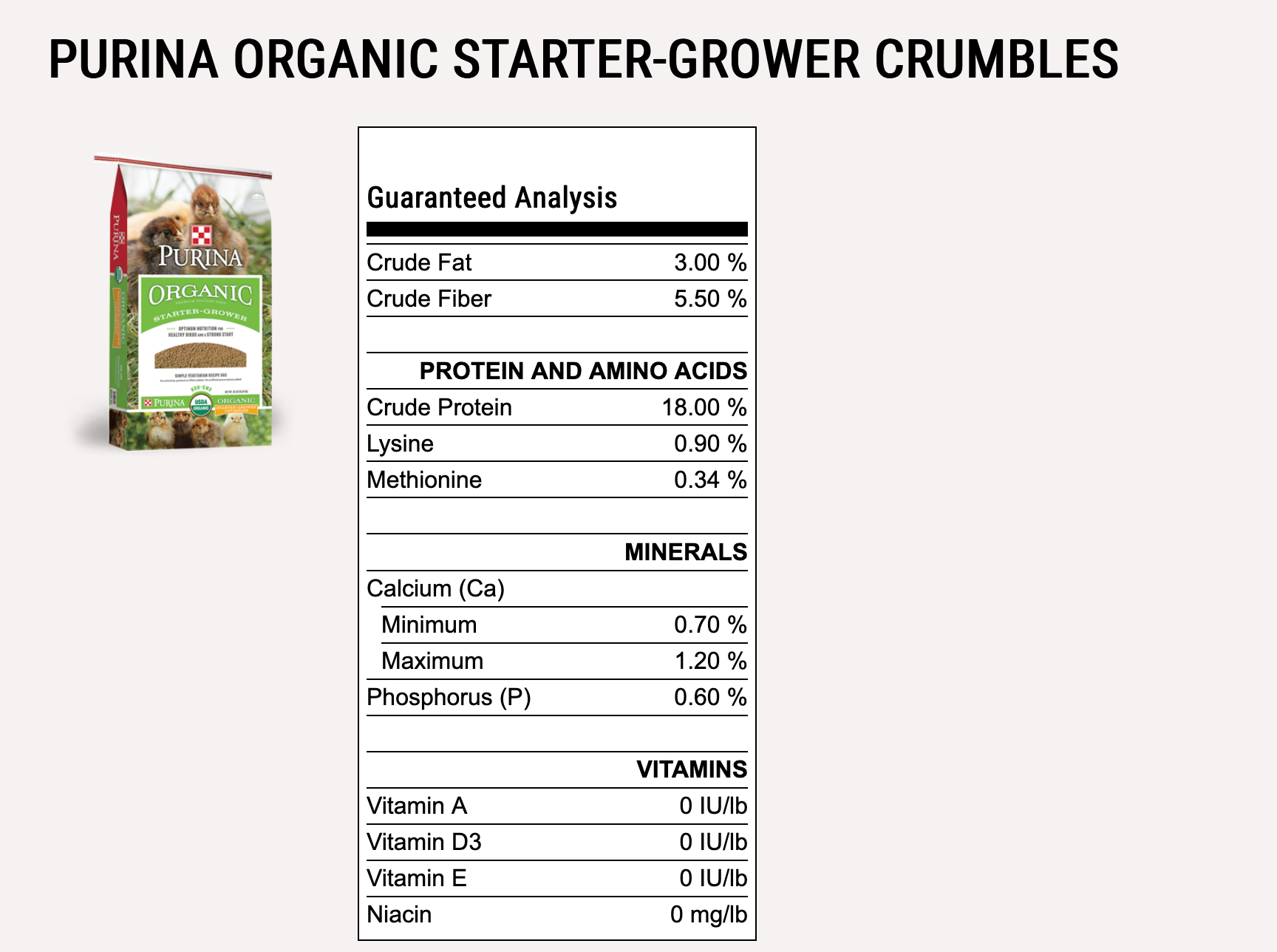
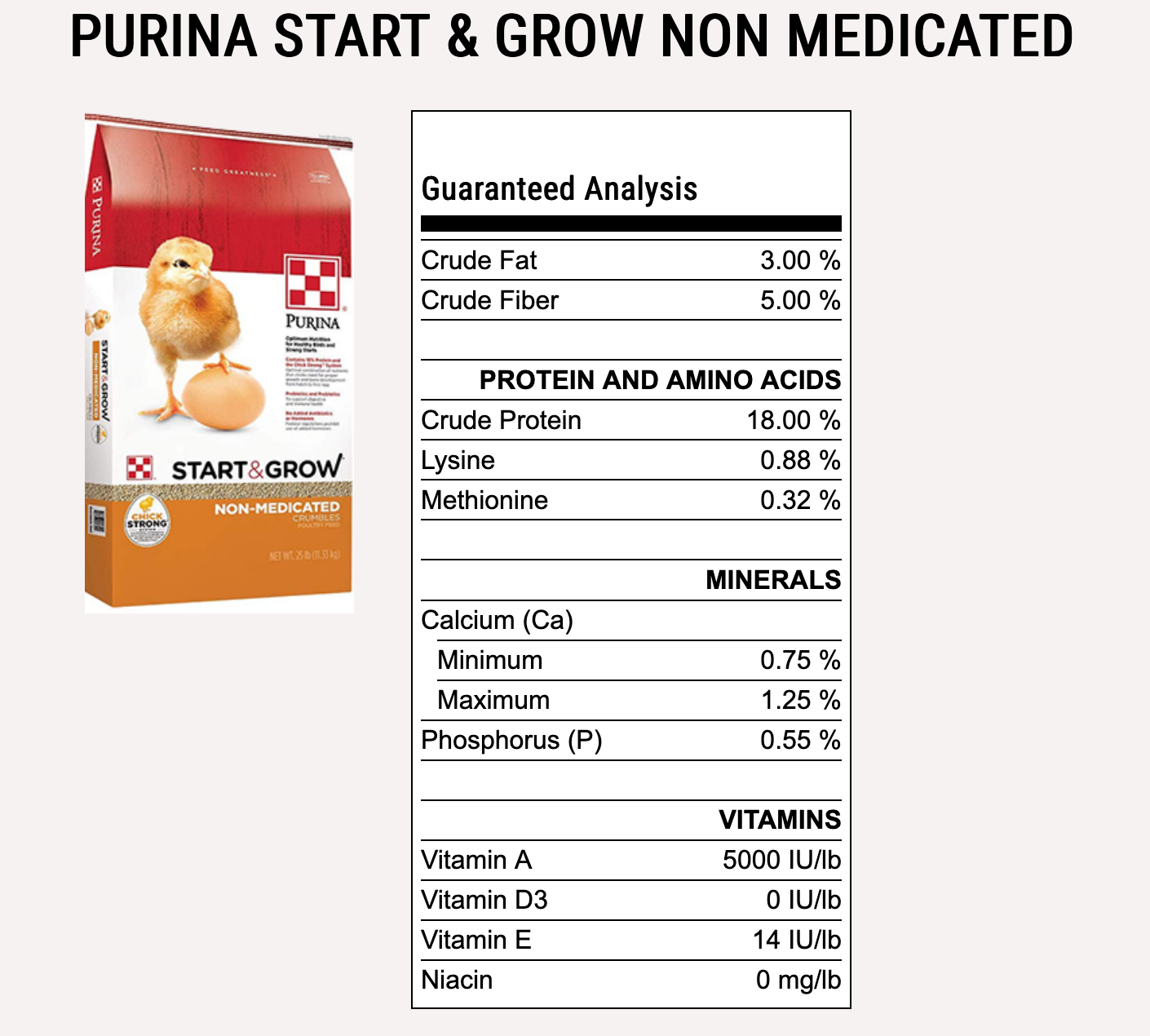
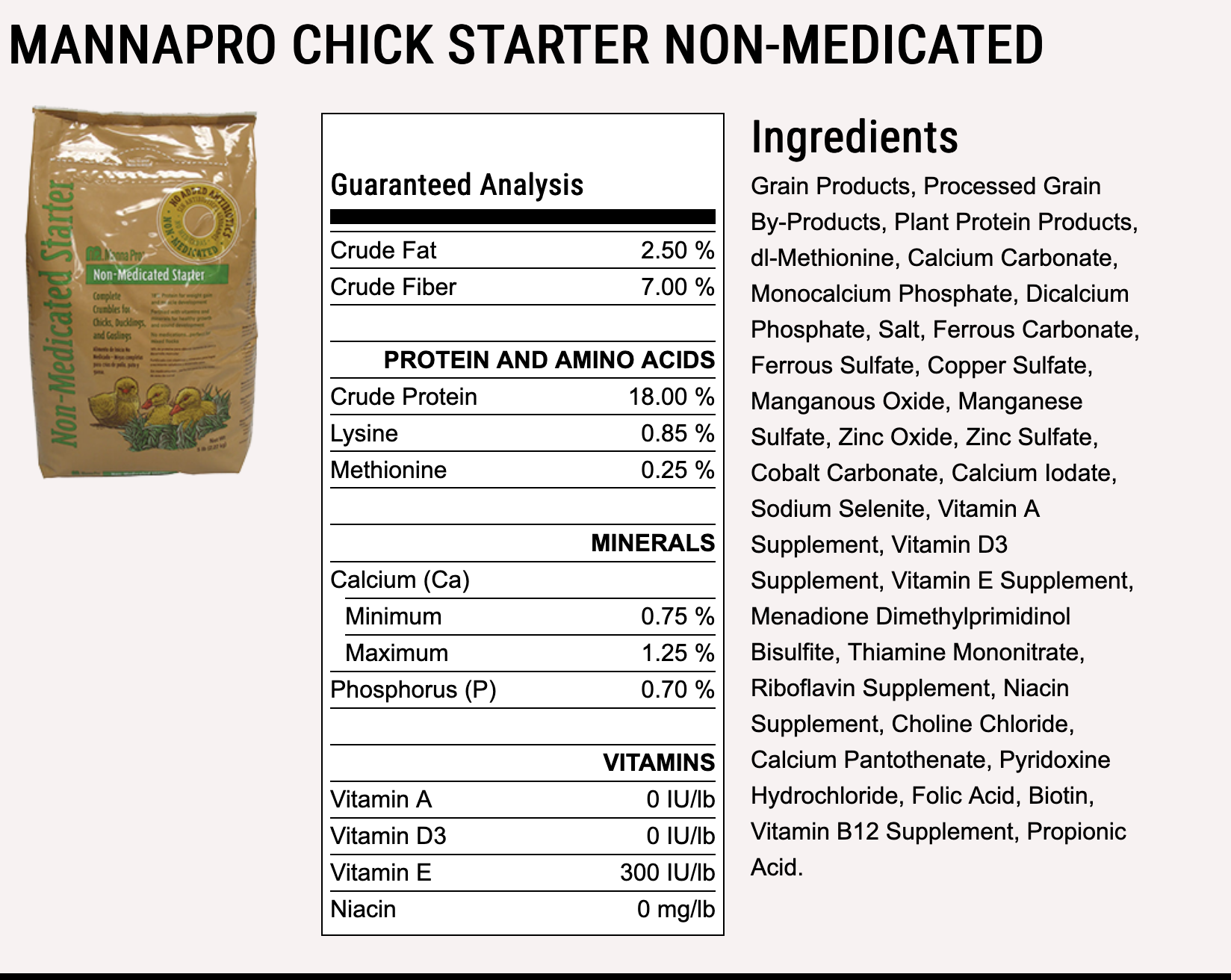
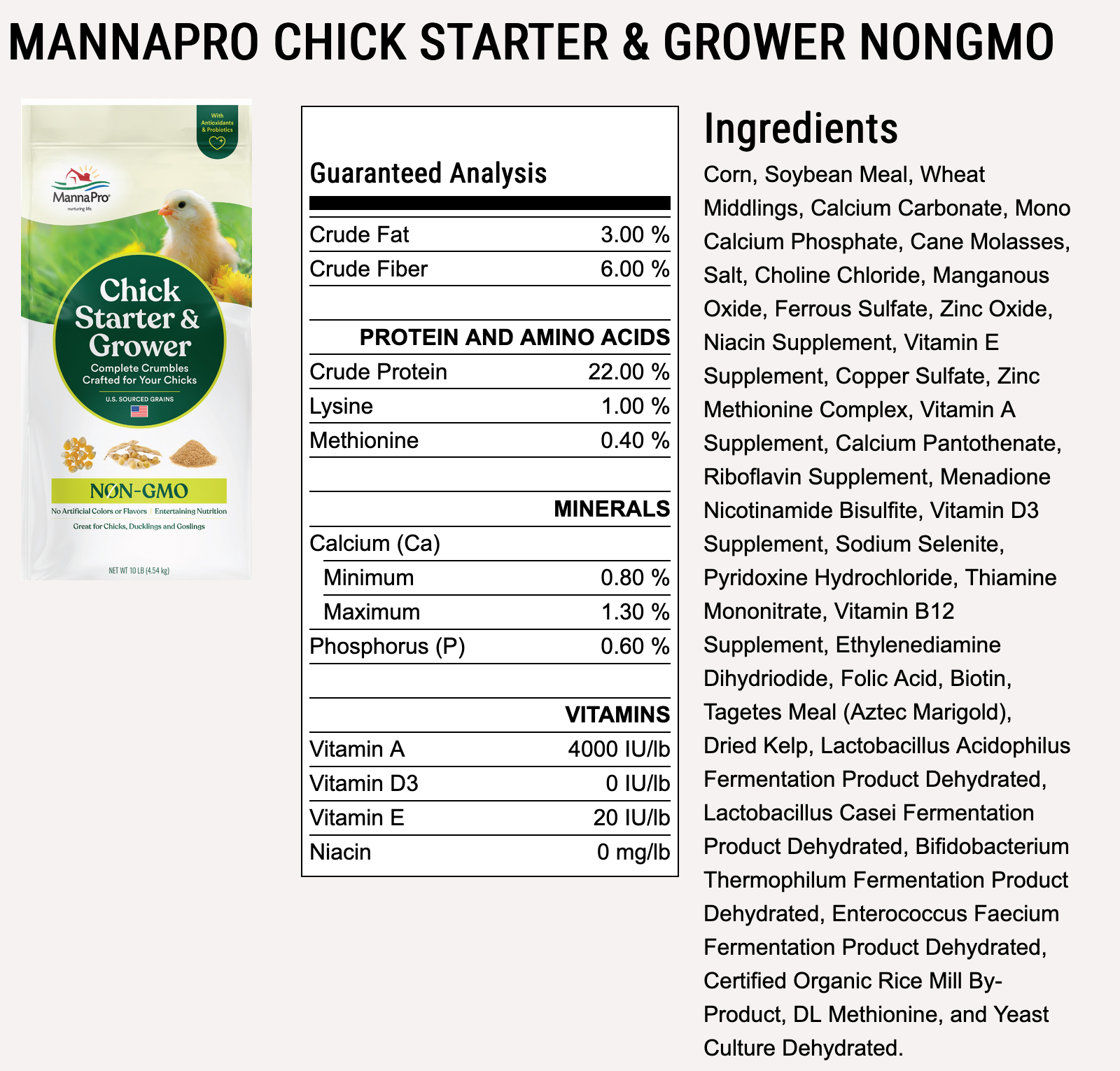
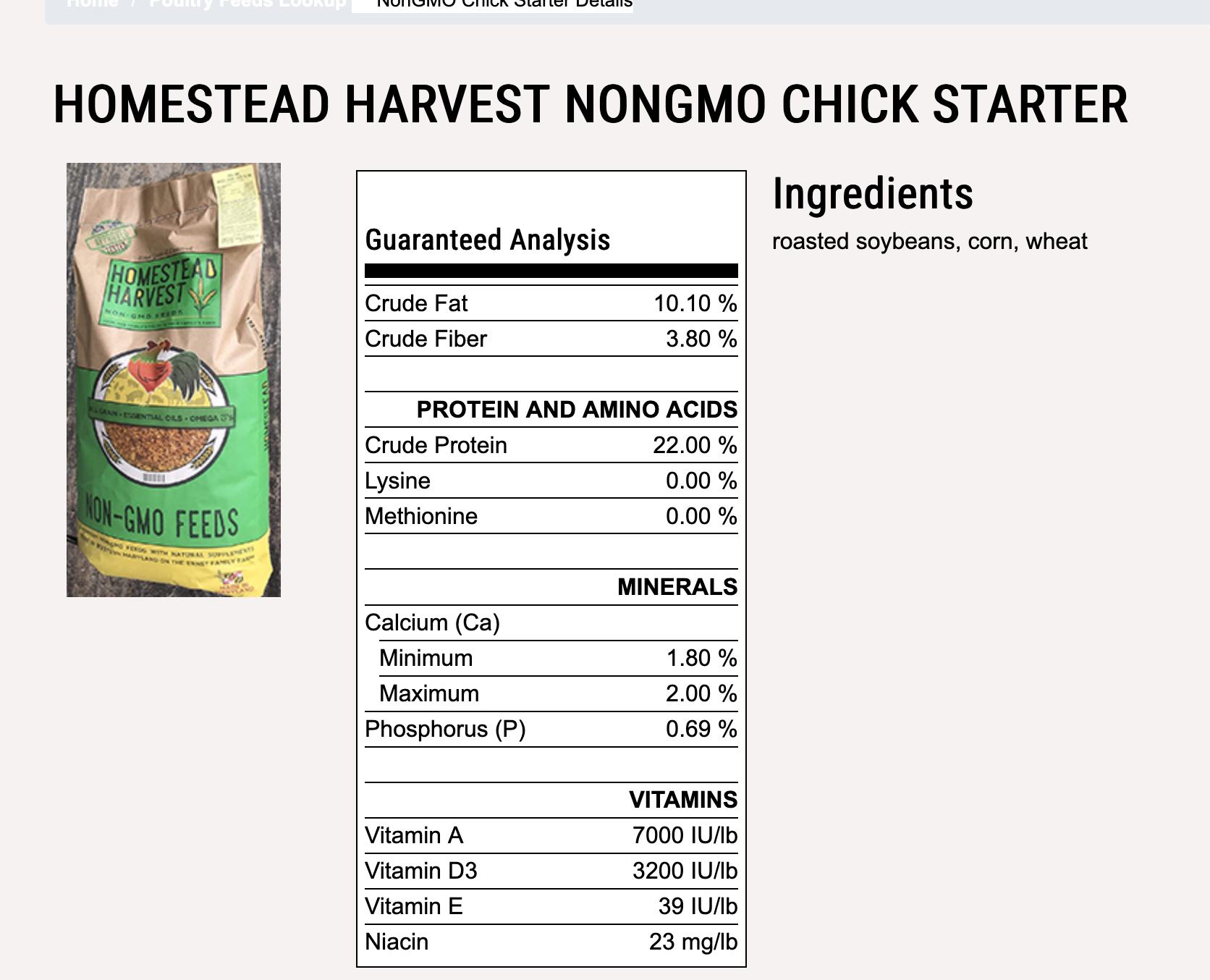



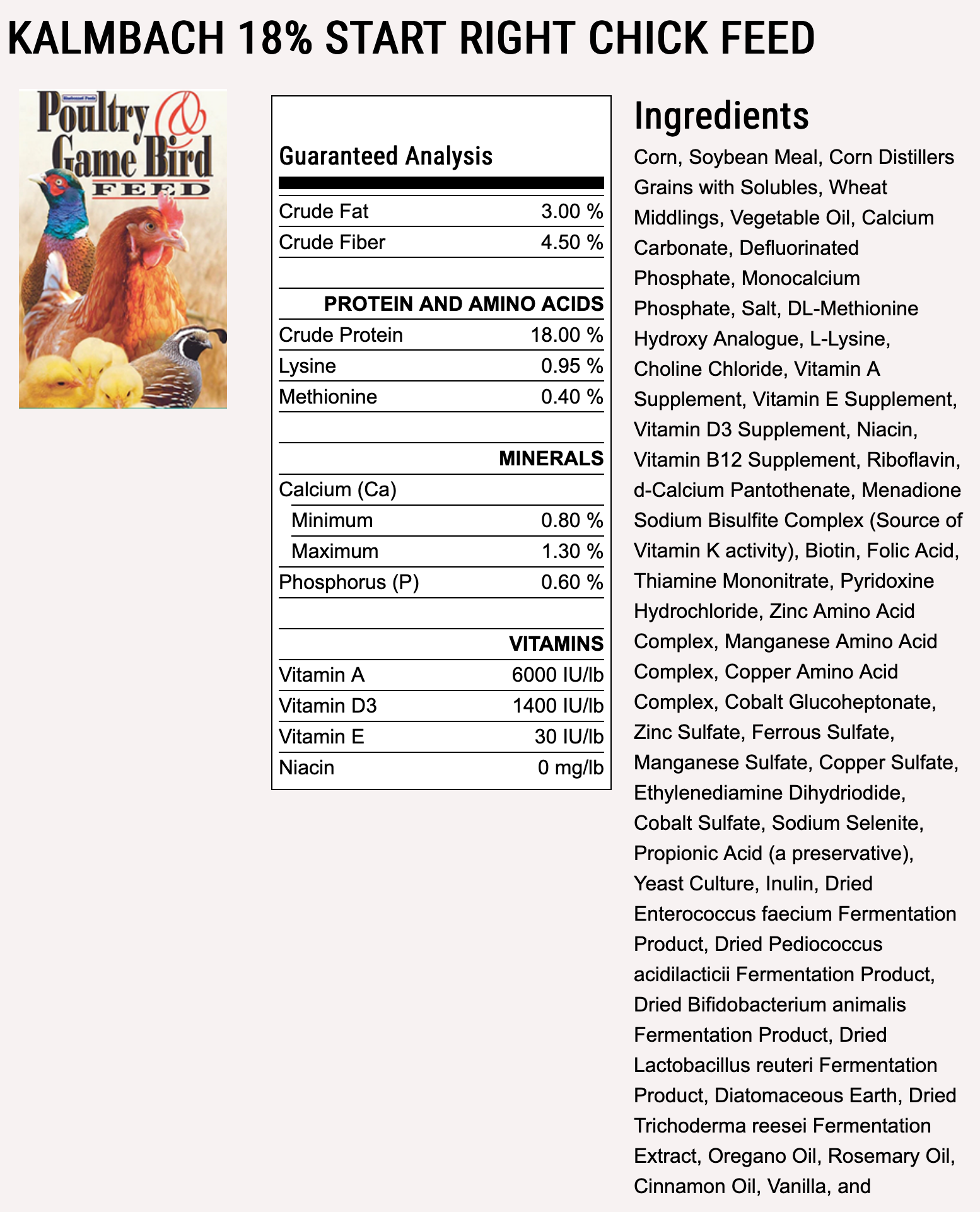
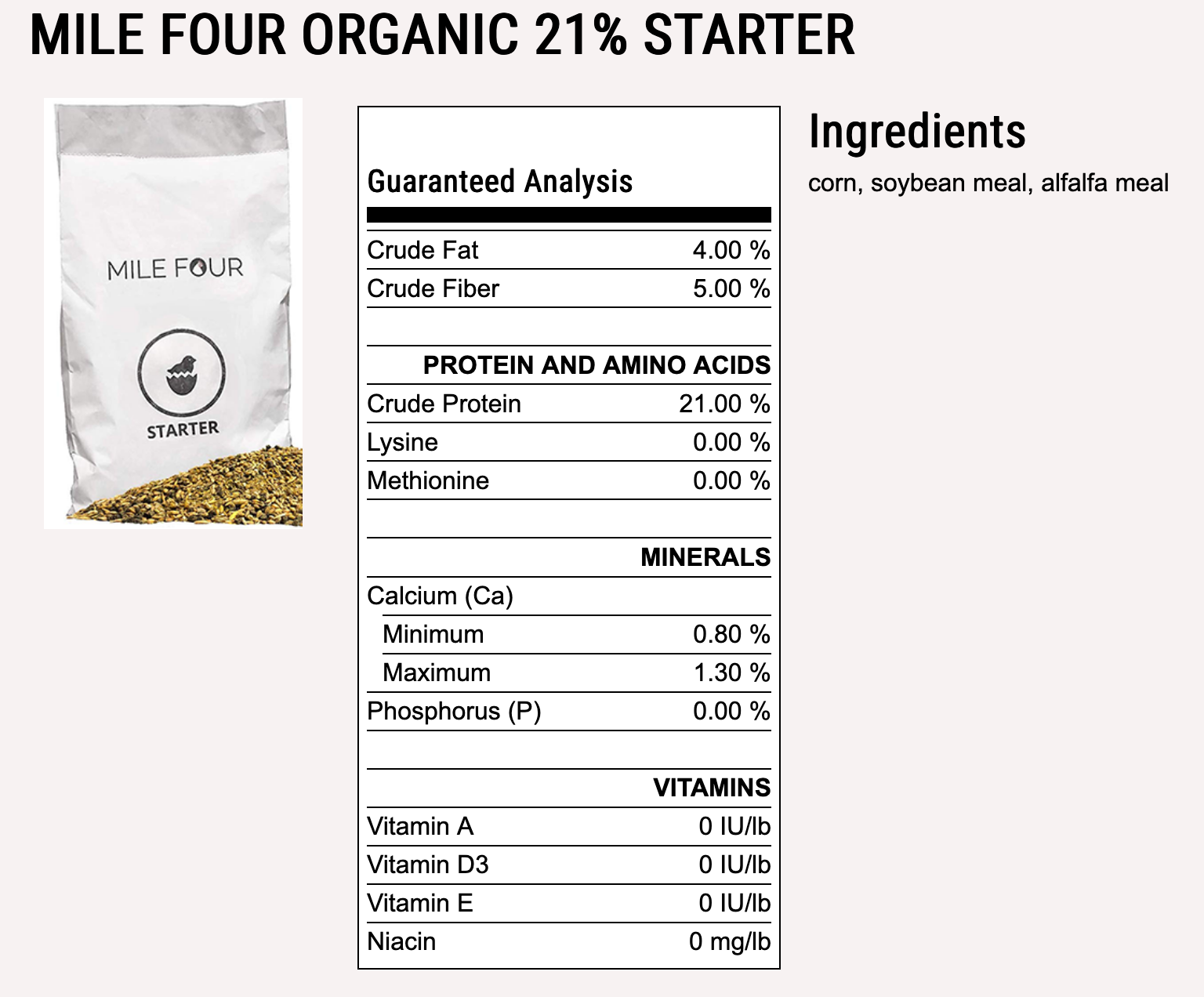
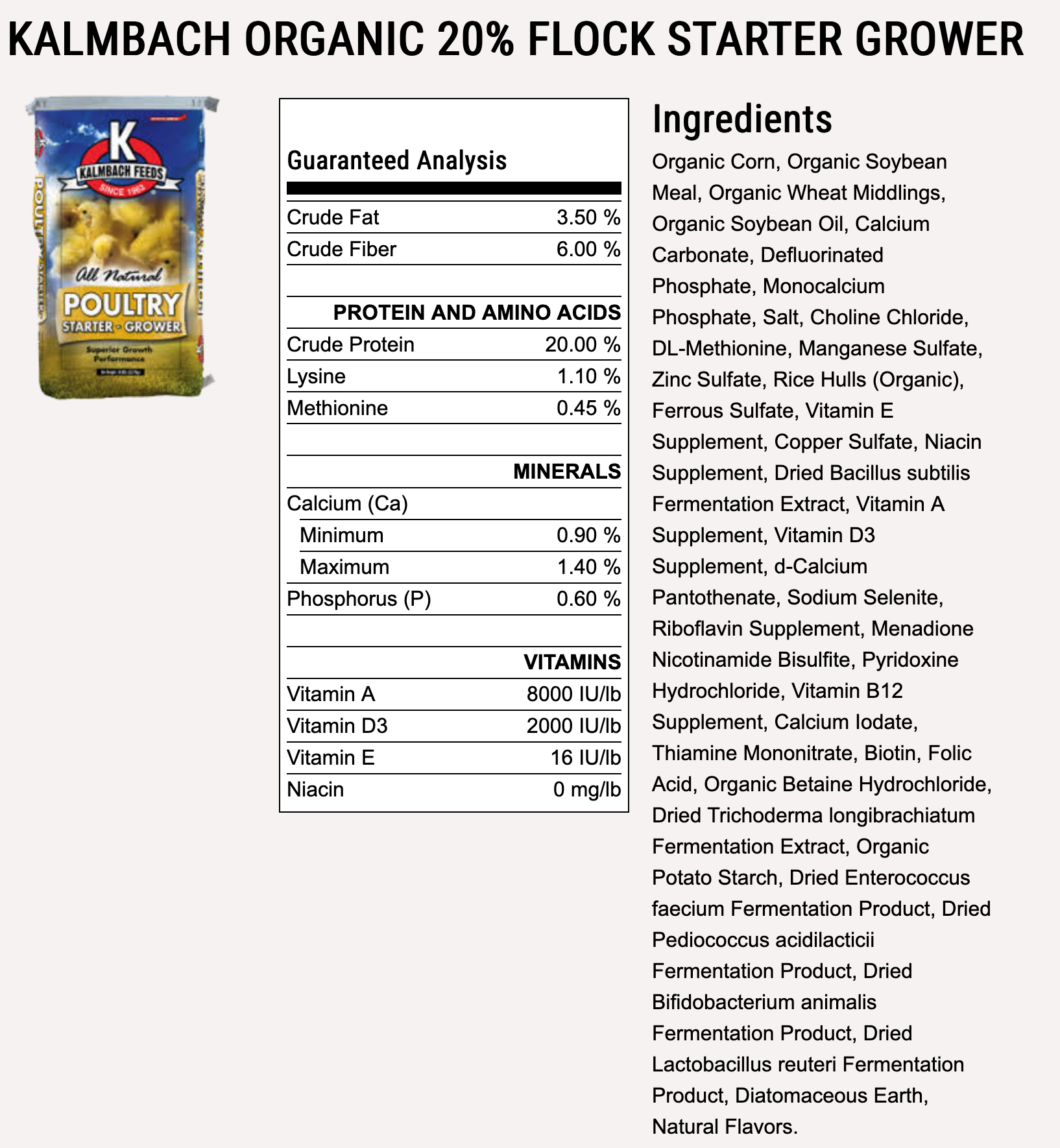
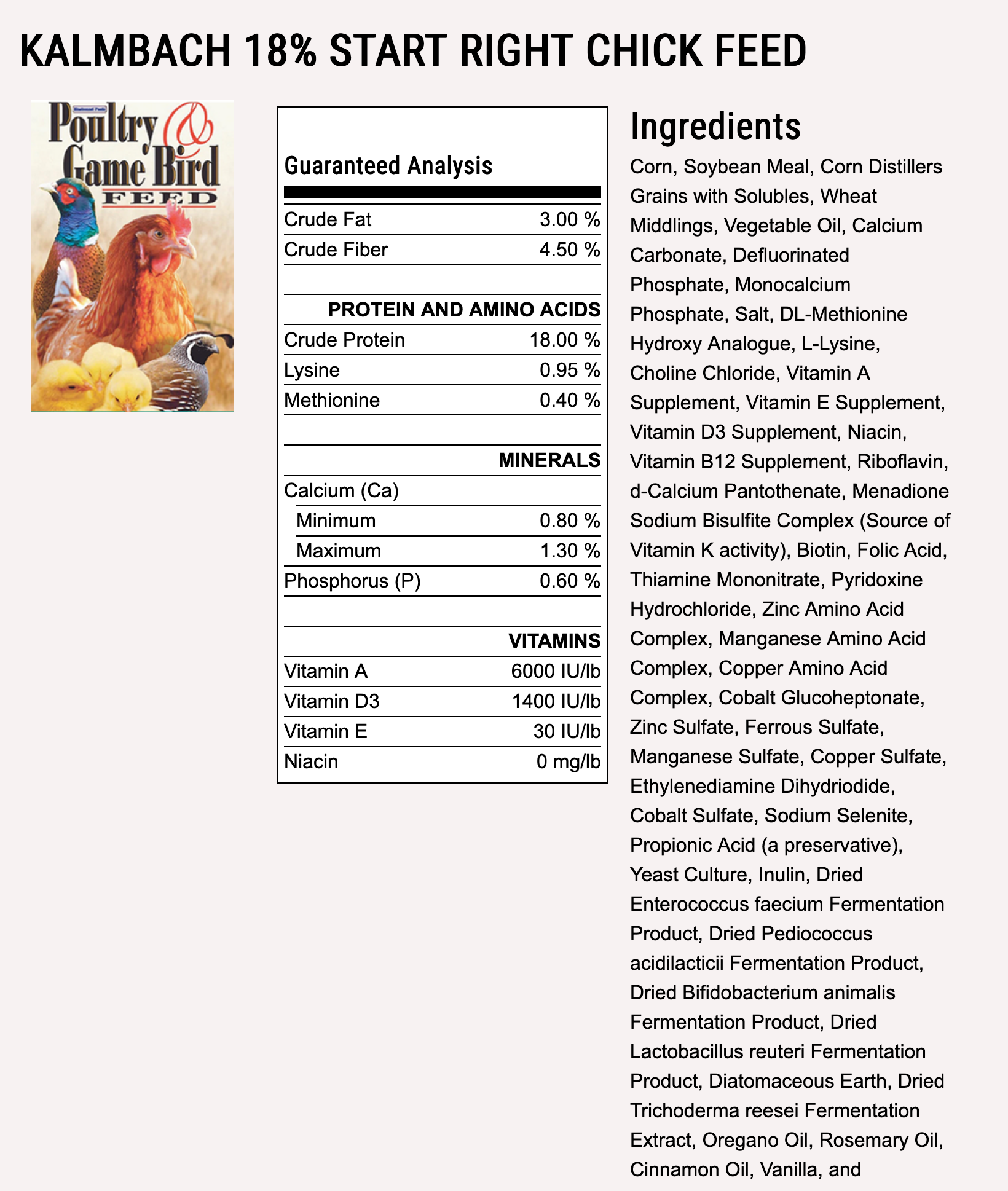
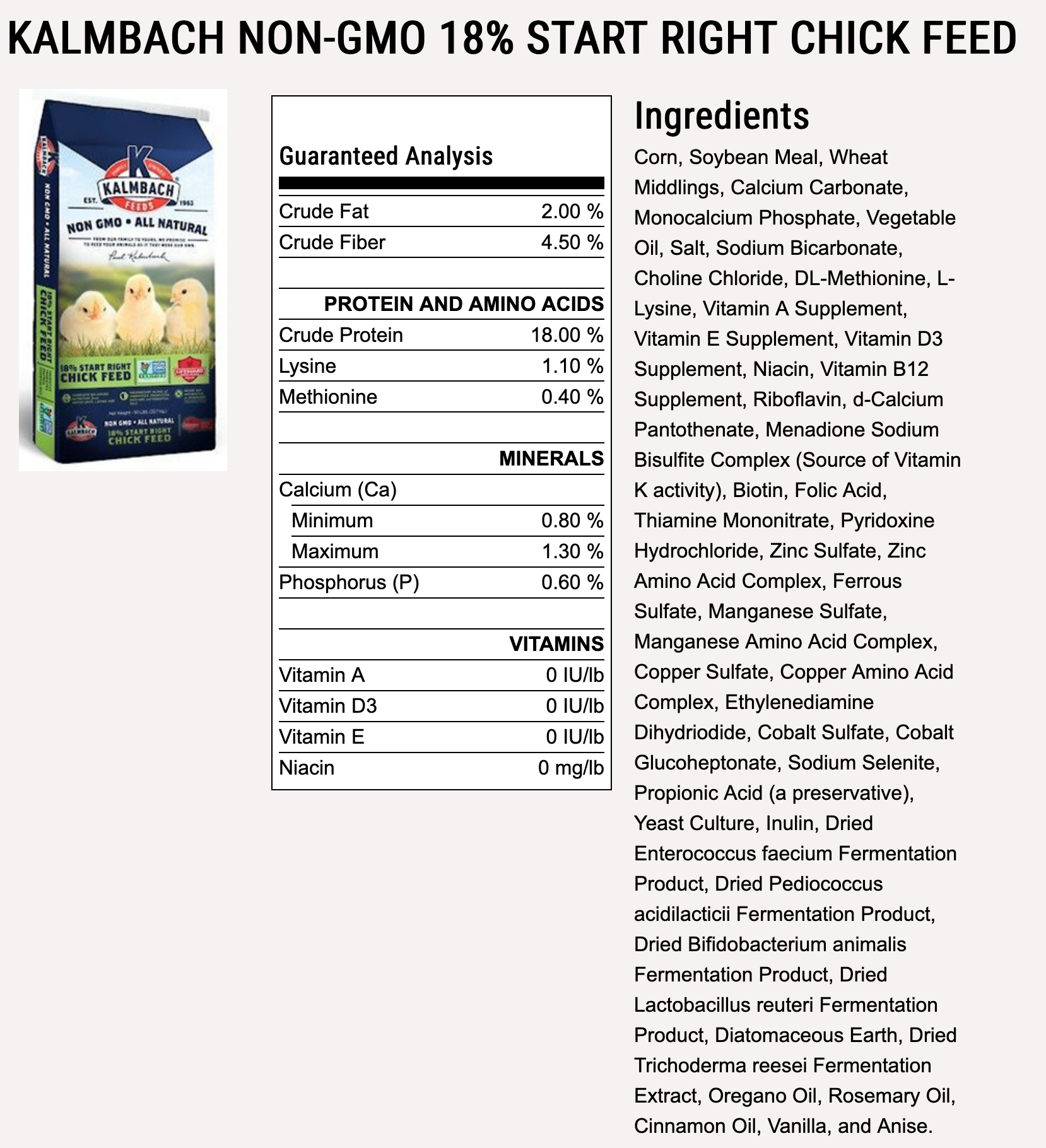
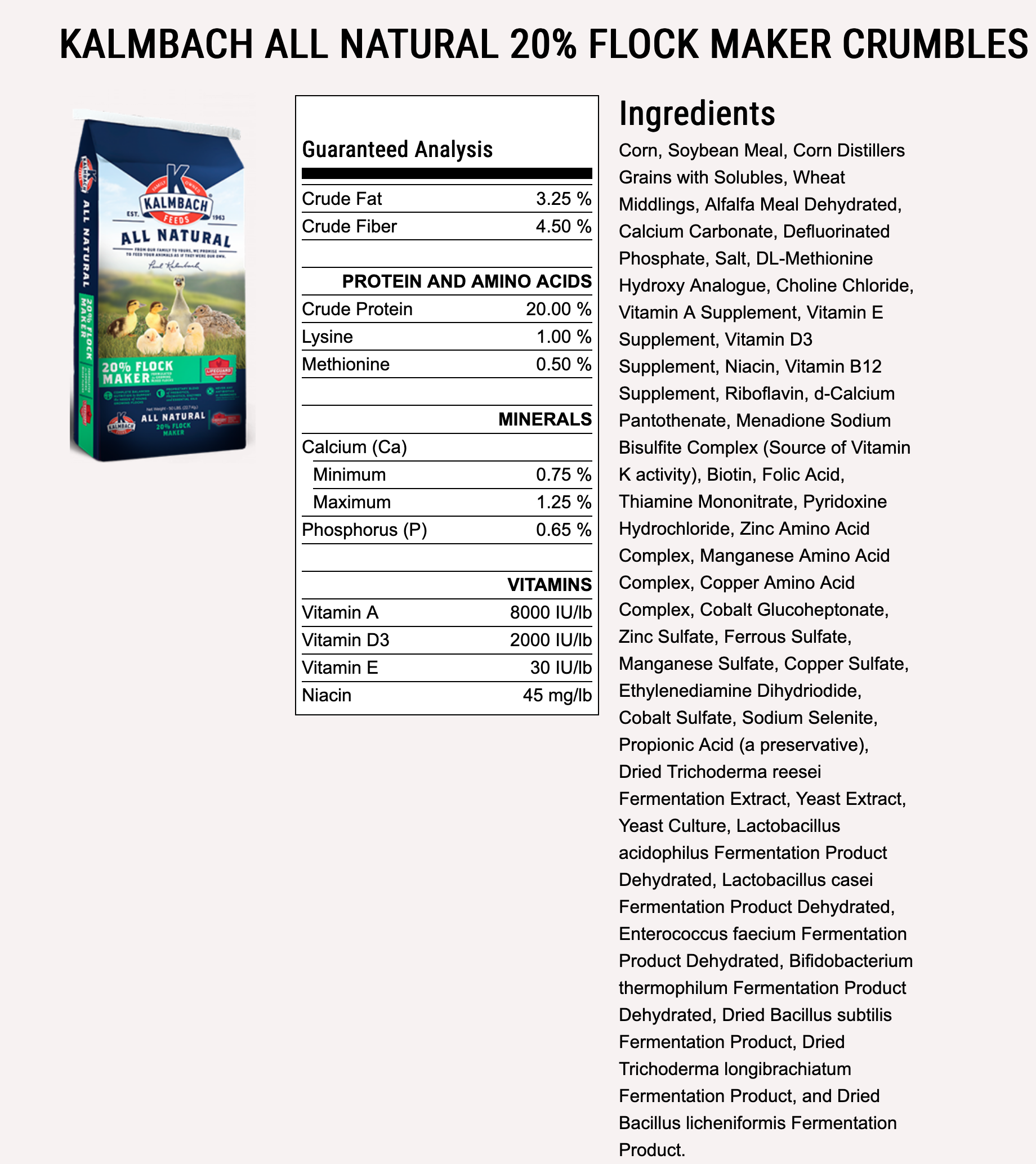
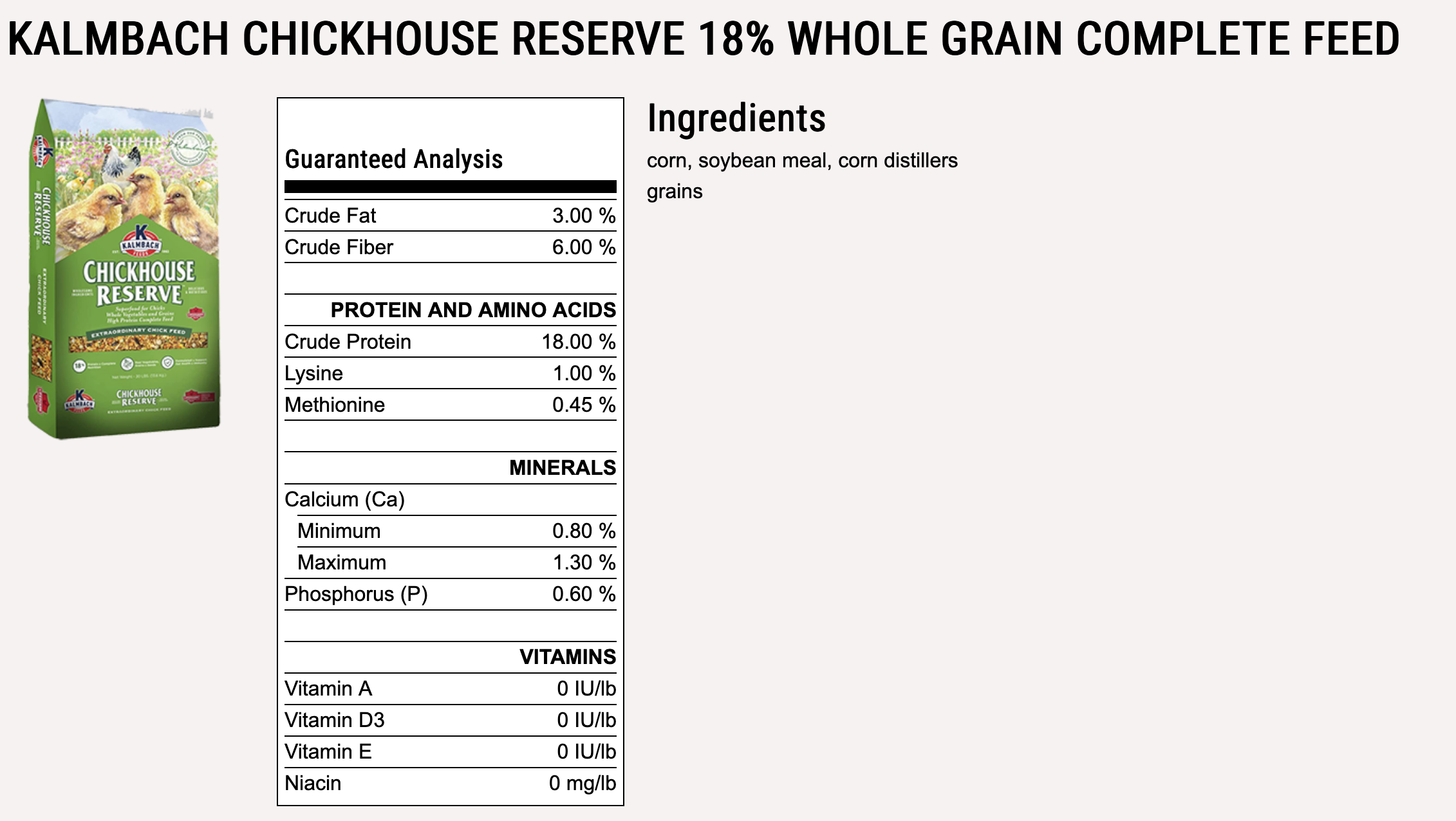
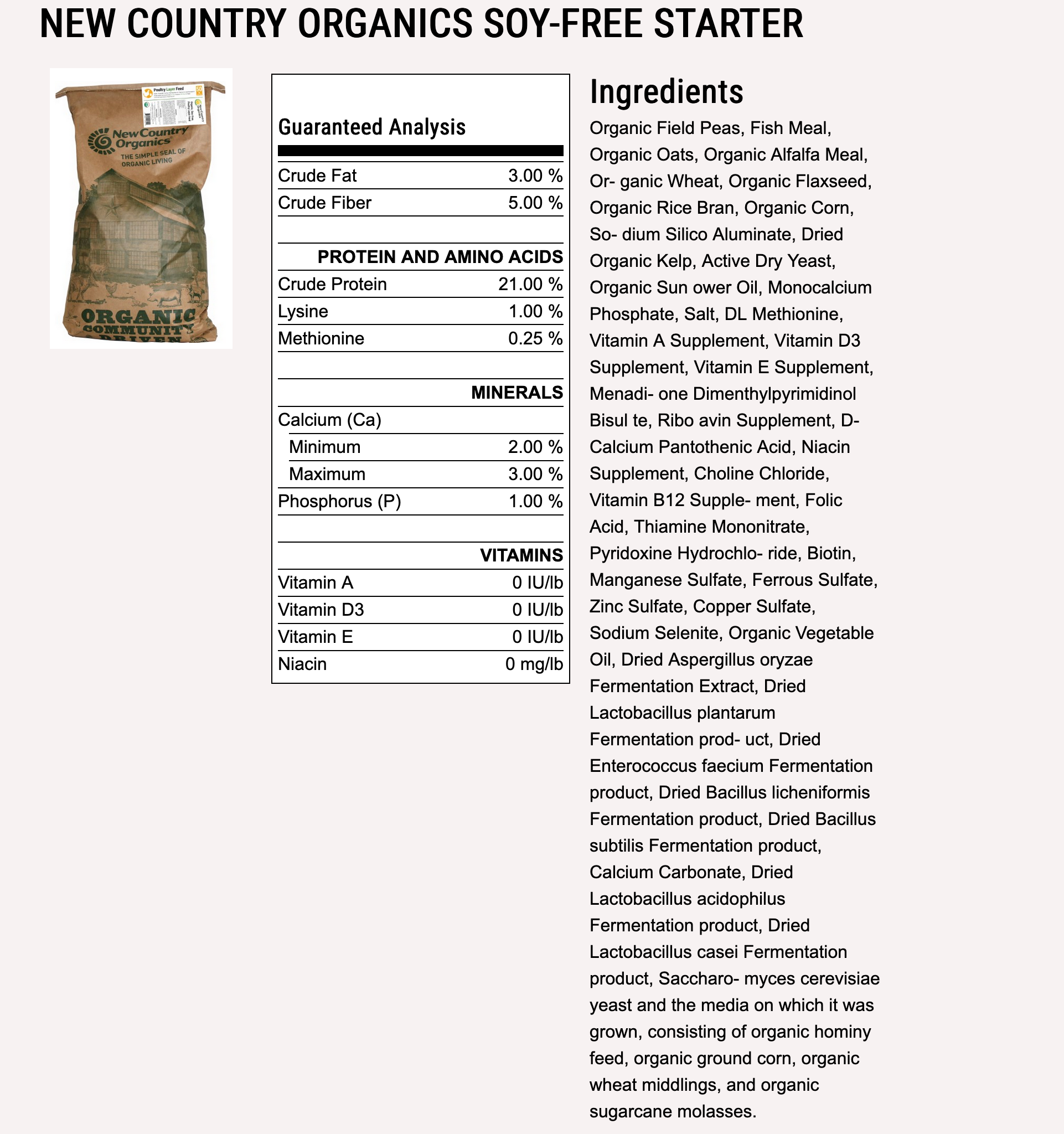
Marek’s Disease: Frequently Asked Questions (FAQ)
Marek’s Disease can be a daunting challenge for poultry owners, but understanding the disease and how to manage it can make all the difference. Below are answers to some of the most common questions flock owners ask about Marek’s, presented in an easy-to-read format.
What is Marek’s Disease?
Marek’s Disease is a highly contagious viral infection caused by a herpesvirus. It primarily affects chickens but can also infect other birds (though not turkeys or ducks). The disease spreads through feather dander, dust, and contaminated environments and causes symptoms such as paralysis, weight loss, tumors, and sudden death. Marek’s is one of the most common poultry diseases worldwide.
Can humans catch Marek’s Disease?
No, humans cannot catch Marek’s Disease. The virus only infects birds and poses no threat to human health. Eggs and meat from infected chickens are safe to eat, as long as the bird is otherwise healthy and not on medications with withdrawal times.
How does Marek’s Disease spread?
Marek’s spreads through feather dander, dust, and respiratory droplets from infected birds. The virus is incredibly resilient and can survive in the environment for months, contaminating coops, bedding, and equipment. Chickens typically inhale or ingest the virus particles, which then infect their bodies.
What are the symptoms of Marek’s Disease?
Symptoms vary depending on the strain of the virus and the bird’s immune response. Common symptoms include:
- Paralysis: One leg stretched forward and one backward, or drooping wings.
- Weight Loss: Birds appear thin, with a protruding keel bone.
- Tumors: Lumps under the skin or in internal organs.
- Gray Eyes (Ocular Marek’s): Cloudy or grayish eyes, leading to blindness.
- Sudden Death: Birds may die unexpectedly without showing any signs of illness.
Can Marek’s Disease be cured?
No, there is no cure for Marek’s Disease. Once a bird is infected, the virus remains in its body for life. However, vaccination can help prevent symptoms and reduce losses in the flock. Supportive care can also improve the quality of life for symptomatic birds.
How can I tell if my flock has Marek’s Disease?
The only way to confirm Marek’s Disease is through a post-mortem necropsy performed by a veterinarian or poultry diagnostic lab. However, common signs like paralysis, weight loss, or tumors may strongly indicate Marek’s. If you suspect Marek’s, contact your local veterinary diagnostic lab for guidance.
What should I do if I suspect Marek’s in my flock?
- Isolate Sick Birds: Remove symptomatic birds from the flock immediately to reduce viral shedding.
- Strengthen Biosecurity: Clean and disinfect the coop, feeders, and waterers.
- Consult a Vet: Reach out to a veterinarian or poultry diagnostic lab for confirmation and advice.
- Vaccinate New Birds: Start vaccinating chicks to help protect future generations.
How can I prevent Marek’s Disease?
- Vaccinate Chicks: Vaccinate all new chicks within 24 hours of hatching for the best protection.
- Quarantine New Birds: Keep new or returning birds separate from your flock for at least 30 days.
- Practice Good Biosecurity: Clean coops regularly, control dust, and prevent visitors or wild birds from entering your flock’s space.
- Breed for Resistance: Select birds that show natural resistance and remain healthy despite exposure.
If I vaccinate my chicks, can they still get Marek’s Disease?
Yes, vaccinated birds can still become infected with the Marek’s virus, but the vaccine helps prevent symptoms like paralysis, tumors, and death. Vaccinated birds may still carry and shed the virus, so biosecurity measures are still important.
Does Marek’s Disease spread through hatching eggs?
Marek’s Disease does not pass directly from parent birds to eggs (no vertical transmission). However, eggshells can become contaminated with feather dander or dust carrying the virus. It’s important to sanitize hatching eggs from a Marek’s-positive flock before incubating them.
Can other poultry species get Marek’s Disease?
Marek’s Disease primarily affects chickens. Other birds like turkeys, ducks, and quail are generally not affected by the virus, though turkeys have their own strain of a herpesvirus that is unrelated to Marek’s. If you raise chickens with other poultry, the chickens can still spread Marek’s within their group, but they won't infect other species.
What should I do with birds that show symptoms of Marek’s Disease?
- Isolate the Bird: Move the bird to a quarantine area to reduce exposure to the flock.
- Provide Supportive Care: Offer high-protein foods, vitamins, and electrolytes to support the bird’s health.
- Consider Euthanasia: If the bird is suffering or severely symptomatic (e.g., paralysis, inability to eat or drink), humane euthanasia may be the kindest option.
- Dispose of the Body Safely: Bury or incinerate the body to prevent further contamination.
How long does the Marek’s virus survive in the environment?
Marek’s virus can survive for several months in the environment, especially in dust and feather dander. It can even persist for years in some cases, making regular cleaning and disinfection critical in Marek’s-positive flocks.
What disinfectants kill Marek’s virus?
Effective disinfectants include:
- Virkon S: A broad-spectrum disinfectant that kills viruses, bacteria, and fungi.
- Bleach Solution: Use a 1:10 dilution of household bleach and water.
- Oxine AH (Activated): Effective against viruses when used with an activator.
Always clean surfaces thoroughly before applying disinfectant, as organic matter like droppings can reduce effectiveness.
Can I sell birds or eggs from a Marek’s-positive flock?
Yes, but ethical guidelines require full disclosure to buyers about the health status of your flock. Be transparent about Marek’s exposure and recommend that buyers vaccinate chicks and quarantine new birds. Eggs should be sanitized before shipping to minimize the risk of contamination.
What is the best way to manage a Marek’s-positive flock long-term?
- Vaccinate New Birds: Vaccinate all chicks within 24 hours of hatch to reduce symptoms and losses.
- Practice Strong Biosecurity: Keep coops clean, control feather dander, and quarantine new additions.
- Breed for Resistance: Focus on breeding birds that remain healthy despite exposure to Marek’s.
- Monitor Symptoms: Regularly check your flock for signs of illness and isolate symptomatic birds promptly.
- Accept the Challenges: Marek’s Disease will remain in your environment long-term, but with proper management, you can maintain a healthy and productive flock.
Have More Questions?
If you have additional questions about Marek’s Disease or need help managing your flock, don’t hesitate to reach out to a veterinarian or poultry expert. With proper care and informed decision-making, it’s possible to manage Marek’s-positive flocks successfully.
Outbreak Response Plan: Managing a Marek’s Disease Outbreak
A Marek’s Disease outbreak can be overwhelming, but having a clear and actionable plan in place can help you manage the situation effectively. While there is no cure for Marek’s Disease, quick action can reduce further spread in your flock, protect neighboring flocks, and minimize long-term impacts. This guide outlines what to do during a Marek’s outbreak, including isolating sick birds, making culling decisions, and improving biosecurity to prevent future outbreaks.
What Is a Marek’s Outbreak?
An outbreak occurs when multiple birds in your flock start to show symptoms of Marek’s Disease. These symptoms may include:
- Lethargy or depression.
- Paralysis (one leg stretched forward and one back, or drooping wings).
- Weight loss or protruding breastbone (keel).
- Tumors under the skin or in internal organs.
- Gray or cloudy eyes (ocular form of Marek’s).
- Sudden death with no prior symptoms.
Since Marek’s Disease is highly contagious and spreads through feather dander, dust, and contaminated surfaces, rapid response is critical to reduce further transmission.
1. Isolate Symptomatic Birds Immediately
Separating symptomatic birds from the healthy flock is the first and most critical step in managing an outbreak.
Steps for Isolation
- Prepare a Quarantine Area:
- Use a secure, well-ventilated space far from the main flock, such as a garage, spare coop, or large dog crate.
- Ensure the area is predator-proof and easy to clean.
- Handle Birds Safely:
- Wear gloves and an N95 mask when handling symptomatic birds to reduce exposure to dander and dust carrying the virus.
- Move birds gently to minimize stress and avoid further weakening their immune systems.
- Minimize Cross-Contamination:
- Care for the healthy flock before handling sick birds to avoid spreading the virus.
- Use dedicated tools, feeders, and waterers for the quarantine area.
- Monitor Closely:
- Track the symptoms, weight, and behavior of isolated birds using a Symptom Monitoring Log.
2. Evaluate and Decide on Culling
Unfortunately, Marek’s Disease has no cure, and many symptomatic birds will not recover. Decisions about humane euthanasia (culling) should consider the bird’s quality of life and the risk of further viral shedding in your flock.
When to Consider Euthanasia
- Severe Symptoms:
- Birds that are paralyzed, unable to eat or drink, or suffering from visible tumors may not recover and could benefit from humane euthanasia.
- No Improvement After Supportive Care:
- If a bird’s condition worsens despite care, euthanasia may be the kindest option to prevent suffering.
- Risk of Spreading the Virus:
- Birds showing advanced symptoms are likely shedding large amounts of the virus. Removing these birds can reduce exposure for healthier birds in your flock.
How to Humanely Euthanize
- Veterinarian Euthanasia:
- If possible, have a veterinarian perform euthanasia to ensure it is quick and painless.
- At-Home Euthanasia:
- Methods such as cervical dislocation or CO2 chambers are commonly used. Ensure you are trained and prepared to perform euthanasia humanely.
3. Strengthen Biosecurity to Prevent Further Spread
During an outbreak, biosecurity becomes even more critical to minimize the spread of the Marek’s virus within your flock and to neighboring flocks.
Key Biosecurity Steps
- Limit Access to the Coop:
- Restrict visitors or outside animals from entering your property.
- If visitors must enter, ensure they wear shoe covers and clean clothing.
- Clean and Disinfect Daily:
- Remove feather dander, droppings, and dust from the coop and surrounding areas.
- Disinfect surfaces, feeders, and waterers with a poultry-safe disinfectant like Virkon S or bleach solution (1 part bleach to 10 parts water).
- Change Your Clothing and Shoes:
- Always wear dedicated coop shoes and clothing when tending to your flock. Wash clothing immediately after use and disinfect shoes after every visit.
- Dispose of Feather Waste Safely:
- Feather dander and dust are primary carriers of the virus. Dispose of soiled bedding, feathers, and droppings far from your coop and property.
- Isolate New Birds:
- Quarantine any new or returning birds for at least 30 days before introducing them to your flock.
4. Protect Neighboring Flocks
Marek’s Disease can spread to other flocks through shared equipment, visiting birds, or even dander carried on your clothing or shoes. Taking precautions to protect nearby flocks is essential.
Preventing Transmission to Neighboring Flocks
- Inform Neighbors:
- Notify nearby flock owners if you are experiencing a Marek’s outbreak so they can take precautions.
- Avoid Shared Equipment:
- Do not lend or borrow equipment, tools, or feeders while managing an outbreak.
- Control Free-Ranging:
- Prevent your birds from free-ranging during an outbreak to reduce the spread of dander to neighboring properties.
- Disinfect Before Leaving Your Property:
- If you visit another farm or location with poultry, disinfect your shoes, clothing, and any equipment you bring.
5. Support the Rest of Your Flock
Even birds that appear healthy during an outbreak are likely exposed to the virus and may be under significant stress. Taking steps to boost their immune systems and reduce stress can help prevent symptoms from developing.
Steps to Support Healthy Birds
- Improve Nutrition:
- Offer high-quality feed, fresh greens, and immune-boosting supplements like:
- Probiotics.
- Apple cider vinegar (1 tablespoon per gallon of water).
- Vitamin supplements (e.g., Nutri-Drench).
- Offer high-quality feed, fresh greens, and immune-boosting supplements like:
- Reduce Stress:
- Keep the flock environment calm by avoiding overcrowding or introducing new birds.
- Protect the coop from predators and loud noises.
- Enhance Ventilation:
- Ensure proper airflow in the coop to reduce dust and ammonia buildup, which can weaken the respiratory system.
- Monitor Closely:
- Watch for early signs of illness in the remaining flock, such as weight loss, lethargy, or changes in behavior.
6. Plan for Long-Term Management
Once an outbreak occurs, Marek’s Disease will persist in your flock and environment indefinitely. Adjusting your management practices will help you control future outbreaks and improve your flock’s resilience.
Long-Term Strategies
- Vaccinate Chicks:
- All new chicks should be vaccinated for Marek’s Disease within 24 hours of hatch and quarantined for at least 14 days to allow immunity to develop.
- Breed for Resistance:
- Focus on breeding birds that remain symptom-free and productive despite Marek’s exposure.
- Improve Cleaning Routines:
- Perform weekly cleanings and monthly deep cleans of the coop to reduce viral load.
- Replace Vulnerable Birds Gradually:
- Slowly introduce vaccinated birds from Marek’s-resistant lines to build a more resilient flock over time.
Quick Checklist: Marek’s Outbreak Response
| Action | Steps |
| Isolate Sick Birds | Move symptomatic birds to a quarantine area. |
| Evaluate for Euthanasia | Decide based on symptoms and quality of life. |
| Strengthen Biosecurity | Disinfect coop, limit visitors, manage dander. |
| Support Healthy Birds | Boost immunity with nutrition and reduce stress. |
| Notify Neighbors | Inform nearby flock owners to protect their birds. |
| Plan for Long-Term Management | Vaccinate chicks and focus on resistant breeding. |
Key Takeaways
- Act quickly to isolate symptomatic birds and reduce the spread of the virus.
- Strengthen biosecurity during the outbreak to protect both your flock and neighboring flocks.
- Support healthy birds with nutrition, stress reduction, and careful monitoring.
- Develop a long-term management plan, including vaccination and breeding for resistance, to manage Marek’s in your flock going forward.
By following this outbreak response plan, you can minimize losses, protect your healthy birds, and take steps to ensure the long-term health of your flock.

